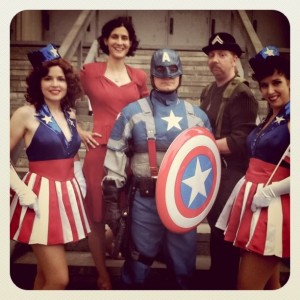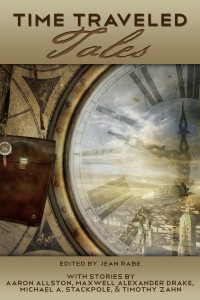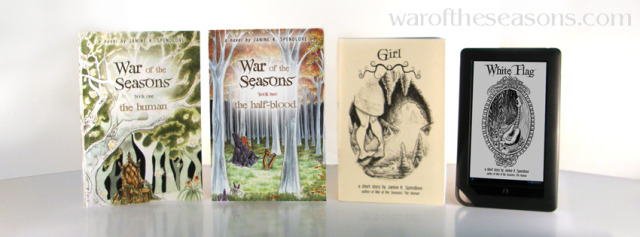Guest blog post: Robert Osterman

I first met Rob many years ago at Dragon*Con through a mutual friend, Maggie Allen (her guest blog post is here). We clicked over love of all things geeky, books, and of course, costuming. In the pic above he’s DumDum to my husband’s Captain America (and that’s me as Agent Carter, in a vintage 1940s dress. The USO girls are Caitlin and Betsy, co-founders of GeekGirlsRun… but more on that in a later post). I’m thrilled that he was so willing to do a guest post for me, and without any further ado…
Jack Sparrow: “The only rules that really matter are these: what a man can do and what a man can’t do. For instance, you can accept that your father was a pirate and a good man or you can’t…. And me, for example, I can let you drown, but I can’t bring this ship into Tortuga
all by me onesies, savvy? So, can you sail under the command of a pirate, or can you not?”
In general I find that line “What a man can do and what a man can’t do” is amazingly applicable across life. When getting stressed about something it seems a good grounding to back up and ask “what can I do?” and “what can I not do?”
Recently I’ve been lucky enough to have the help of fellow writer Janine Spendlove who has asked me to write this guest post for her. We’ve been collaborating a great deal on a new project of mine, and it has gotten me thinking a great deal about not just what is “right” for a certain type of character or profession but also what is in the gray area between “right” and “so wrong it just doesn’t make sense”.
She has been kind enough to write up a “Top Ten Things People Get Wrong about Military Writing”. As a return favor I’m offering a discussion on the variations in that field.
________________________________
I’d like to break down characters into four groups and talk about the advantages and disadvantages of writing for each of those groups.
1. The Typical
This group represents characters who act and behave exactly like everyone else in that group. Any teacher could read a scene with a typical teacher in it and say “yep, that’s my life”. You, as the writer, have nailed the mannerisms, the speech, the vocabulary, and
most importantly the “person” of the teacher. They could be any teacher in America right there smiling back at you out of the prose.
And that is part of the danger of writing the typical: it’s predictable. Any teacher who reads about that character will know exactly what’s going to happen because it’s what 90% of teachers would do in that situation. The character follows policies, they plan good,
though probably not amazing, lessons. They do their thing just like everyone else.
On the other hand, you do offer up the chance for those not familiarwith teachers to have a glimpse into the typical life of one. Or, perhaps you’re writing about a surgeon. Providing a typical surgeon’s day, where going into a person’s body and removing a cancerous growth is as routine as your own walk down to the water cooler, you give readers a chance to see into that life. But if your main character is a typical run of the mill surgeon, odds are they won’t see what they’re doing as remarkable themselves, which make make having an interesting story difficult to pull off.
Which is why you may want to delve into the…
2. Mostly Typical
You can describe these characters as “He’s your typical FBI agent but…” and then what ever follows is the one thing that will drive the story. Regan, the protagonist of Mind the Thorns, is supposed to be “your typical accountant except she’s a vampire.” At least that
was my goal when I started writing her. Likewise you might describe Capt. Norrington of Pirates as “your typical naval officer but he’s madly in love with Elizabeth Swan.”
Generally the mostly typical make the easiest characters to keep consistent as well as interesting to readers both familiar with the material and not. While I might find watching over the shoulder of a typical doctor interesting, those who are doctors, or who are familiar with them, won’t find much to engage them. Adding a few quirks that separate them from the norm keeps it all interesting and avoids the risk of your prose falling into the category of “Documentary”.
3. The Far Fetched
This tends to happen the most with groups that casual writers do not have good information on. As a teacher I see this most of the time when teachers are portrayed on television. These are characters who spend most of their time sitting in the teachers’ lounge, wander into class late, or have students take over their teaching for them. I recall a series of episodes of Buffy the Vampire Slayer where Willow actually took over teaching the computer classes and lamented that her peers did not respect her as a teacher. Sure, it makes for some interesting plot twists and character development, it’s pretty far out there, far enough that you would never expect to see it yourself in your life time but maybe you know a guy who knows a girl who saw it happen to her cousin.
To approach this differently, it is historically true that women fired muskets at the British column retreating from Concord to Boston during the battles there at the start of the American Revolution. There is a documented account from a British officer of seeing a man and his daughters firing down on the column from an upstairs window of their house.
This is one of the only documented occurrences of such happening during the Revolution. So, Hollywood would not be totally wrong to include women taking shots from behind trees in a movie about the Revolution, but should be acknowledged that this was a rare, rare thing, indeed.
In the cases of the Mostly Typical and the Far Fetched there is a great deal of value in acknowledging that what is happening is unusual, that it is not typical on its own. To be specific in Spendlove’s notes to me, she makes the comment “well, we don’t normally do things that way, but given the circumstances, I wouldn’t want to do it the other way either.”
In the case of Willow’s teaching it would sound very much like Phineas and Ferb: “Aren’t you kids a little young to be taking delivery of three tons of concrete?” / “Yes. Yes we are.”
4. No, no, and NO!
There are somethings that are just so far out there that they shouldn’t happen. Things that if they absolutely must be included in the prose entire plots should rotate around why such a horrifically improbable thing occurred. These are things that would get you sent to prison for years, significant risk of life or family, or run counter to years and years of training and education. These are things that you can’t just hand wave with a “everyone understands; on to the next chapter where we all forget that happened.”
This is best described as cases where when you talk to a member of that profession or group with an idea they just look at you and respond, “No, we just don’t ~do~ that.”
There is no real advantage to including these in your writing. These are cases so egregious that anyone familiar with the subject will put down the book in disgust and walk away. At least with the “Far Fetched” you open up plot opportunities and provide room for the characters to react and grow with these new developments that have altered their lives. But when you go into the realm of “No, no, and NO!” you’ve given up credibility as a writer.
 Robert Osterman is a full time teacher, father, husband and writer.
Robert Osterman is a full time teacher, father, husband and writer.
His first novel, FantastiCon follows a woman having the worst time at
the best convention. He is also the author of Mind the Thorns, a
reader-directed web novel with regular updates.
Missed it? Here’s the guest post by bestselling Star Wars author Aaron Allston.
Oh, and Man of Steel was terrible – here’s why…
~ ~ ~ ~ ~
 And after reading all that, please don’t forget that I’ve got a kickstarter going for Time Traveled Tales, with stories by Aaron Allston, Michael A. Stackpole, Timothy Zahn, Bryan young, many others, and yours truly! http://tinyurl.com/m7w5ox6
And after reading all that, please don’t forget that I’ve got a kickstarter going for Time Traveled Tales, with stories by Aaron Allston, Michael A. Stackpole, Timothy Zahn, Bryan young, many others, and yours truly! http://tinyurl.com/m7w5ox6
Lastly, need a copy of one of my books? As it happens you can buy them here.

